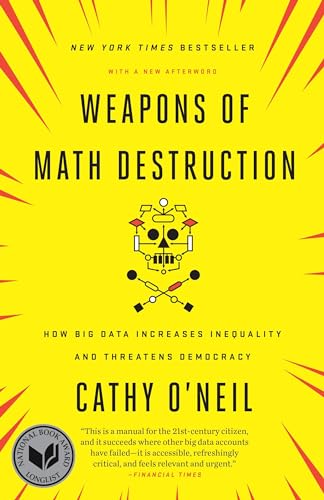Weapons of Math Destruction
How Big Data Increases Inequality and Threatens Democracy
Cathy O'Neil
BOOK REVIEW

In a world increasingly driven by algorithms and big data, Weapons of Math Destruction: How Big Data Increases Inequality and Threatens Democracy is not just a book; it's a wake-up call to all who inhabit this data-saturated landscape. Cathy O'Neil, a data scientist turned whistleblower, expertly navigates the shadowy realm of mathematical models and predictive analytics, ripping away the veil to expose how these ostensibly benign tools can wreak havoc on society's most vulnerable.
O'Neil doesn't simply chronicle the dangers of big data; she unveils a labyrinth of injustices entrenched within our systems - from education to employment, criminal justice to credit scoring. These algorithms, which she astutely dubs "Weapons of Math Destruction" (WMDs), are anything but neutral. They perpetuate inequality, often discriminating against minorities and the economically disadvantaged, while being shielded by a facade of objectivity and efficiency. Here lies the chilling reality: these mathematical models, designed with the intent of streamlining decision-making, have become the very instruments of oppression they were never meant to be.
Critiques of O'Neil's work often come from those who misinterpret her call to action as an outright condemnation of technology. However, her argument is far more nuanced and devastating: it's not the data itself that is malevolent, but the way we wield it. Think about your credit score; it's a figure that follows you like a shadow, determining your worthiness for loans or housing with little regard for context. O'Neil's revelations compel you to confront the unsettling truth - the algorithms designed to help us often end up harming the most marginalized citizens among us. Like a siren's song, these systems seduce with the promise of progress while drowning out the voices of those they diminish.
What makes Weapons of Math Destruction resonate deeply is O'Neil's ability to interlace personal anecdotes with rigorous research. The stories of individuals ensnared by these mathematical traps evoke a visceral response. For instance, she shares the heart-wrenching experiences of a single mother denied a place in a better school for her children, merely because a model deemed her to be a "risk." This is not just a statistic; it's a lost opportunity for a family yearning for upward mobility. The emotional weight of such narratives hangs heavy in the air, almost unbearable.
This work transcends mere analysis; it is a call for urgency in our very own democratic fabric. As O'Neil postulates, the real danger of WMDs is their impact on our democracy, eroding civil liberties and creating echo chambers of inequality. The blind trust we place in these systems is akin to walking a tightrope without a safety net; one misstep and the consequences can be catastrophic. O'Neil's careful weaving of case studies reminds us of the power we relinquish to algorithms when we turn a blind eye to their inner workings.
While many readers applaud O'Neil's forthrightness, some have criticized her for lack of tangible solutions to combat these issues. But perhaps that is the brilliance of her approach - she ignites a fire within us to demand accountability, to question the systems we've come to accept as gospel. Her book serves as a mirror, reflecting society's complicity in the myriad injustices propagated by unregulated technology. Ask yourself: how often do you recognize the algorithmic forces at play in your everyday life?
In the aftermath of her revelations, you may find yourself questioning your own relationship with technology. Are you merely a passive consumer of data, or can you become an active participant in the fight against WMDs? Weapons of Math Destruction is more than a critique; it's a manifesto calling for awareness and action. It's a clarion call to recognize the shadows lurking in the algorithms that define so much of our contemporary existence.
As you finish this captivating exploration, don't merely close the book; let it ignite your passion for justice. O'Neil's work serves as both a cautionary tale and a beacon of hope, urging you to challenge the very systems designed to govern us. By understanding how big data can undermine democracy, you arm yourself with the knowledge necessary to navigate this complex landscape and resist the silent tyranny of numbers.
The clock is ticking, and the stakes have never been higher. Will you rise to the occasion, or will you let the WMDs dictate your fate? The choice is yours, but the time to act is now. 🌍✨️
📖 Weapons of Math Destruction: How Big Data Increases Inequality and Threatens Democracy
✍ by Cathy O'Neil
🧾 288 pages
2017
#weapons #math #destruction #data #increases #inequality #threatens #democracy #cathy #oneil #CathyONeil